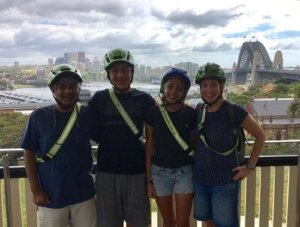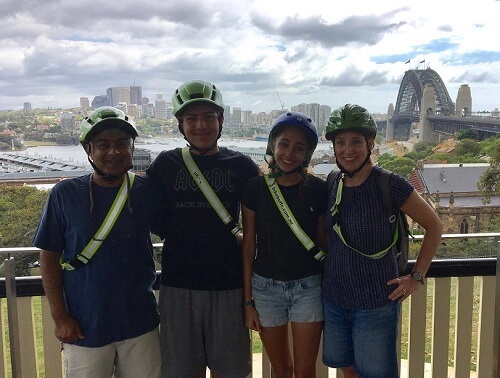Getting to Know the La Piana Team: An Interview with Lara Jakubowski
In this new post, we’re excited to introduce Lara Jakubowski, Senior Consultant. Here, she shares a little about her passion for the sector, thoughts on trends impacting nonprofit sustainability, and the personal pursuits that connect her to family and community.
This blog post is part of our series featuring the La Piana team. This week, we spoke with Lara Jakubowski, Senior Consultant. Based in Denver, Lara joined the firm in July 2017 and works with nonprofit and foundation clients nationally.
How did you decide to focus your career in the nonprofit sector?
I feel like the nonprofit world kind of pulled me in. My intent had been to work in economic development, and I was heading down that path in business school when I landed a great internship with a loan fund where I got to visit some 60 nonprofits over the course of a summer. It was an amazing experience, to learn about them and to meet people who were so passionate about their missions. It was an entree into a whole new universe I didn’t really know anything about, but I felt a draw.
After graduating, I was struggling to find the kind of jobs I wanted in economic development, but the Community Development Financial Institutions (CDFI) world offered a great opportunity. It was exciting to offer financial tools to nonprofits, and I loved the fact that not only were they doing great work, but they appreciated the business perspective I could bring. It was like management consulting, in a way. I wasn’t just making them a loan, but helping them to build their internal capacity — coaching them, talking through their budget, and helping them become stronger organizations. Since then, I’ve continued to have an emotional connection to the work, and I’ve never really left the sector.
You spent the past several years at The Nonprofit Centers Network (NCN) working with organizations on shared spaces. What is one thing you learned from that experience that you’ll be bringing with you to full-time consulting?
What NCN taught me the most is how much work nonprofits are doing to break down silos and do work differently. There’s a real from-the-ground-up desire for collaboration. I think maybe 10 or 20 years ago, the sector was worried about funders having too influential a role in driving collaboration, resulting in “collaboration for collaboration’s sake.” But what I’ve seen more of is the real drive of organizations to better serve clients or service areas by co-locating and sharing space and other resources — collaboration as a means to an end, not just a response to funders telling them they need to collaborate.
The term “collaboration” is so overused that it does start to sound trite. But if you look deep, this is nonprofits’ competitive advantage: they’re collaborating. It’s not just lip service. And they don’t undertake it lightly, which is important because it’s hard work!
What do you see as the top challenges and/or opportunities facing the sector today?
There’s something about competition, where we’re seeing a lot more corporations or quasi-public/private actors coming into a space where smaller nonprofits have done the footwork of surfacing a need in the community or defining the market around an issue area. It may be that the bigger players can offer new solutions or scale them faster, but it’s kind of heartbreaking when nonprofits work so doggedly in an issue area and all of a sudden a corporate entity comes in and offers their own solution. Unless they form alliances of some kind, smaller nonprofits just can’t compete.
Even when you see so many nonprofits trying to get to scale, it’s unclear how often that’s really plausible. And when those organizations and people that have been fighting that fight and developing expertise in that area are gone, what happens if the corporation decides it wants to take up a different cause? You end up having to recreate the wheel. So there’s a kind of threat there — or a tension, at least — that speaks to the need to be more mindful of history, the big picture, and the long-term. I worry about the nonprofit infrastructure in light of these kinds of changes.
What are your favorite types of consulting projects?
What’s most rewarding is when you get to work with the right client, at the right time for them, on the right questions to really be able to help advance their work and leave them in a better place. I’m acutely sensitive to nonprofits’ budget issues, and I know when they’re making a commitment to invest in a consulting project, it’s resources that aren’t going to something else. That’s why it’s so important that they get what they need out of the engagement, but you also have to meet each other half-way.
For the nonprofit, it’s really like taking on a whole special project. The nonprofit leaders I’ve seen do it really well have taken this approach, assuming that additional responsibility — not just allocating their own time, but being a liaison to the board, staff, and other stakeholders that need to be brought along for the project. When you have a confluence of all those components, and you’re on the same page, and it clicks, it’s so exciting.
What do you enjoy doing outside of work?
Biking is my thing right now — when I have time. I actually started when I was a kid; my dad and I would do these long trips where we’d pack our tents on our bikes and circle Lake Ontario. I guess I got hooked, because I’ve always come back to it. And Colorado is a great place to do it. Also, whenever my family goes on a trip, I push for a bike tour! (Photo: Lara Jakubowski, at far right, with her family — ready to go biking on vacation in Sydney.)
Is there a particular book or movie that has recently made an impact on you?
My favorite book, and one I always go back to, is A Fine Balance, by Rohinton Mistry. I like books you get lost in, and it’s an epic novel set in India that immerses you in a time, place, and set of characters. The first time I read it, I thought, “Wow, such a dire situation,” and yet the story it told was one of such resilience. My husband’s family is from India, so I’ve been there a few times, and when you do the work we do in nonprofits in the U.S., it’s one thing, but if you look at the systematic poverty and environmental issues in places like India, you see that people are really struggling, but you also see such great strength.
If you could have lunch with anyone, who would it be and why?
Angela Merkel. I’d love to pick her brain about what her life is like as a woman in that kind of leadership position in these times. It must be fascinating.


Comment section